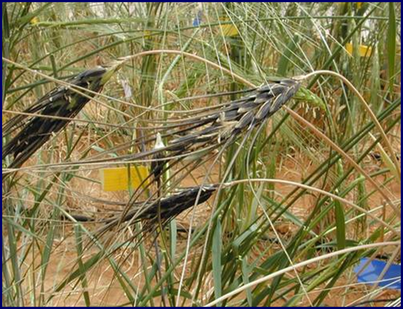 Every spring in the Biblical Garden, religious school students sow two strains of ancient wheat, einkorn wheat, the ancestral mother of all wheat, and emmer wheat, the genetic source of modern wheat varieties. Wild einkorn often survives in sandy or rocky soils where other varieties of wheat fail. Emmer wheat has a higher yield with fatter kernels and more nutrients than einkorn. Rich in gluten, it was the variety commonly grown for bread-making throughout the eastern Mediterranean region and in Egypt during the Israelite sojourn there. The “bread of affliction,” the unleavened dough which the Israelites, in their haste, carried on their journey from slavery to freedom, was made from emmer wheat. Indigenous wild wheat grows today in the rocky soil of the Galilee and Golan Heights. The genetic sources of modern bread wheat stem from these ancient grains. In our day, wheat provides 20% of the calories and proteins consumed around the globe. The impacts of population growth, political instability, and climate change are of urgent humanitarian concern. Scientists are investigating ways to improve the hardiness, nutritional value and yield of modern wheat as one way to address the hunger that stunts the lives of millions of children and adults. Much of this work is being done in Israel. The Wild Cereal Gene Bank at the University of Haifa’s Institute of Evolution provides a gene pool of over 3,000 wild wheat samples, sourced mostly from Israel. Scientists use this material in searching for useful genes that can be cross-bred into domesticated wheat to improve drought and disease resistance, protein content, and adaptability to varied soils and rainfall levels. When we gather at our Passover seder tables, we raise our matzah, our “bread of affliction,” and read: “let all who are hungry come and eat.” We invite those who hunger to join us and be filled, and to hear the Passover story of our liberation from bondage in Egypt. Conditions of bondage continue to exist, as people in our community and millions more in our wider world struggle with food insecurity every day. The Passover message applies not only to this one night that is different from all other nights, but in every night when someone, somewhere goes to bed hungry. We can do more to support the local agencies and organizations that glean excess farm produce, collect and distribute unsold food from markets, operate food banks and supply soup kitchens. We can support organizations, such as Mazon, which advocates for the hungry and works to strengthen food and nutrition programs at the local, state and national level. We can enrich our Passover experience by being aware that our tables, laden with abundant and nutritious food can be shared through tzedakah and through actions that help meet the basic need for sustenance in our human family. Comments are closed.
|
AuthorsMichael Schlesinger is Temple Sinai’s Biblical Gardener. Mike has been gardening since he was eight years old. He used to grow grape vines and make wine when he lived in California. He now tends to our garden, continuing the traditions started by Catherine Walters. Archives
March 2020
|

Affiliated with the Union for Reform Judaism
30 Hagen Avenue • Cranston, RI 02920 • 401-942-8350 Office: dottie@templesinairi.org Rabbi Jeffrey Goldwasser: [email protected] |
Want to sign up for the weekly Sinai Scroll email?
Click here to receive weekly updates on Temple services, events and a message from the Rabbi. |


